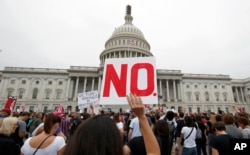What Does Amendment 1 Mean in Your Own Words
What does the First Amendment say?
The First Amendment states: "Congress shall make no law respecting an establishment of religion, or prohibiting the free exercise thereof; or abridging the freedom of speech, or of the press; or the right of the people peaceably to assemble, and to petition the Government for a redress of grievances."
The freedoms in the First Amendment include the freedoms of religion, speech, press, assembly, and the right to petition the government.

What does the First Amendment do?
The First Amendment is one of the most important amendments for the protection of democracy.
Freedom of religion allows people to believe and practice whatever religion they want. Freedom of speech and press allows people to voice their opinions publicly and to publish them without the government stopping them. Freedom of assembly allows people to gather in groups as long as they are peaceful. And the right to petition the government makes it possible for people to lobby the government, point out where it does not follow its own laws, and to sue if a wrong has occurred.
When was it created?
The First Amendment is part of the Bill of Rights. To protect individual rights, the framers of the U.S. Constitution added 10 amendments to the document in 1791, three years after the Constitution was ratified.
Are there exceptions to the freedoms in the First Amendment?
There are limits to the freedoms in the First Amendment as people's individual rights must be balanced against the rights of society.
For example, a person cannot force the tenets of his or her religion on others while trying to practice that religion. Similarly, harmful speech, such as yelling "fire" in a crowded room, is not protected speech, nor is publishing a lie that causes harm to someone. Also, different types of speech have different amounts of freedom. Political speech is considered different than commercial speech, which includes advertisements.
Who determines what is protected?
That is where the courts come in. The meaning of the First Amendment has been the subject of disputes over the years and continuing interpretation by the courts.
Landmark Supreme Court cases involving the First Amendment have dealt with the rights of citizens to protest U.S. wars, burn the U.S. flag, and the publication of classified government documents.

How did the decision about CNN reporter Jim Acosta relate to the First Amendment?
The judge in the case involving CNN reporter Jim Acosta did not rule on the overall First Amendment issues involved in the matter, but instead ruled only on the Fifth Amendment issues, which grants people the right to due process.
"The judge's ruling today hinged on process or really lack of process that CNN's reporter Jim Acosta was given," Georgetown law professor Joshua Geltzer told VOA.
He said that although the case was not technically a First Amendment case, it was about the free press.
"Ultimately, when you are looking at due process, you are looking at the interests at stake of the government and of the individual whom the government is taking some action in relation to," Geltzer said.
The reporter "wasn't given an opportunity to go through some sort of process that might allow him to be treated fairly by the government as is required in many contexts when the government takes away something of value," he added.
What Does Amendment 1 Mean in Your Own Words
Source: https://www.voanews.com/a/what-is-the-first-amendment-and-what-does-it-do/4662700.html
0 Response to "What Does Amendment 1 Mean in Your Own Words"
Post a Comment